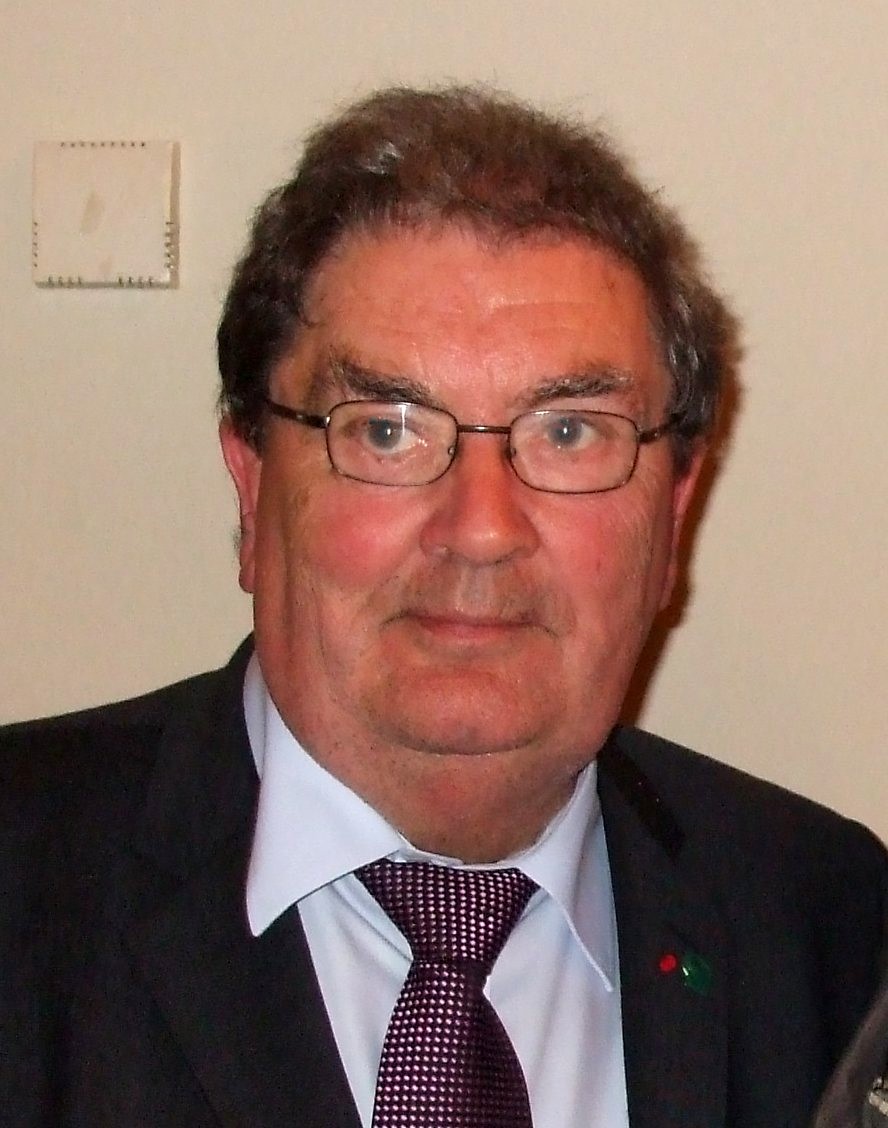Former President Bill Clinton described the late John Hume as “the Irish conflict’s Martin Luther King.”
A native of Derry, a founder of the nationalist Social Democratic and Labour Party (SDLP) and co-recipient with David Trimble of the 1998 Nobel Peace Prize, Hume is remembered as a determined driving force behind the Northern Ireland peace process, leading up to the Good Friday Agreement.
Hume died August 3. His contribution to the cause of peace in Northern Ireland will be commemorated October 22 in a Zoom-based event sponsored by St. Joseph’s University’s Irish Studies and the English Department. The presentation features a screening of “John Hume in America,” followed by a Q and A with the film’s director, Maurice Fitzpatrick, with an introductory lecture by Nicole McClure, Ph.D. of Kutztown University, “Visualizing Truth, Seeing Empathy: Documentary Films, the Troubles and the Peace Process.”
The first official event for the fledgling Irish Studies program, it was scheduled to take place in early April. Then the pandemic hit and the event was canceled, necessitating the move to online later on.
“The idea for the event came from Maurice Fitzpatrick, who approached us last year when he was at Villanova,” says Kersti Tarien Powell, D.Phil., assistant professor and program director of Irish Studies. “He was the Heimbold Chair at Villanova. He reached out to St. Joseph’s and asked if we would be interested in collaborating. At the time, we were just about to get the official go-ahead for our Irish Studies program, and of course, we were incredibly interested.”
It isn’t the first time St. Joseph’s and Villanova have collaborated on Irish-themed presentations, even before SJU instituted its Irish Studies minor. Powell expects those collaborations will continue.
Aside from the possibility for a great opening program for Irish Studies, Powell and colleagues were interested in this event for another reason. In 1986, Hume received an honorary doctorate from the university. The degree was conferred because of Hume’s work for peace. “It’s incredible that we get to commemorate his work here at SJU,” says Powell.
Pulling together the Hume event has been challenging, she adds, but at the same time enriching “because Maurice Fitzpatrick and Nicole McClure have been just a dream to work with and have been most accommodating, and everyone at St. Joseph’s is just so excited about this event. People have been incredibly helpful, and I can’t thank the IT team enough. They’ve been working on the technical side of this and taking care of everything behind the scenes.”
The onset of the pandemic might have been seen as an obstacle to this presentation initially, but it is precisely because it will be hosted over Zoom that it could draw a larger audience. For example, it will be easier for SJU alumni to take part, as well as members of the broader community.
Students, of course, are a primary audience—which makes it especially appealing for Richard Haslam, Ph.D., an associate professor in the university’s English department, who is teaching a class about the Northern Ireland Troubles through literature.
A native of North Belfast, Haslam is intimately familiar with the Troubles. As a young person, he lived through that difficult time.
“North Belfast was one of the areas of the greatest numbers of shootings and deaths,” Haslam explains. “We were in a little middle class area, but it was surrounded by working class areas. I knew two people who were killed as a result of the Troubles. So that personalized it in a way, but on the other hand you get used to it growing up. You just got used to getting searched at the security points when you went into the town center or hearing bombs and things like that. In one sense, it became part of the background. On the other hand, obviously, if it involved people you knew or family you worried about, then it became more personal. So I certainly remember.”
Haslam has seen other presentations about the life of John Hume, though he has not seen the Fitzpatrick documentary. He is hoping that it will bring out the importance of the American dimension—how Hume used his formidable powers of persuasion to get U.S. politicians involved, ultimately influencing previously warring parties to come to the table.
The event ties in neatly with Haslam’s field of expertise, which is exploring how artists depict violence, along with the ethical and artistic complications that occur as a result.
Haslam’s students will be watching the film, taking part in the Q and A and listening to the introduction by McClure, and discussing their findings the next day. “I’ll be asking them to discuss what they saw in the documentary, how it connected with what they already know about Northern Ireland, and how they would connect it to the works of fiction that we’ve been looking at,” he says. “So it’s great timing”
Pandemic aside, it’s been great timing for Powell, too.
Powell hopes the Hume event will draw more attention to the university’s Irish Studies minor. It is, she says, an exciting adventure.
“We’re very much hoping to bring Irish thinkers, authors, filmmakers and writers to our campus,” says Powell. “I just can’t tell how pleased I am that this is happening. And although it’s via Zoom, we’ll start with something of contemporary significance. It’s truly something to be proud of.”
The program begins at 5 p.m. Register for it here.
Above photo by Óli Gneisti (2008-06-23 15:19) John Hume at City Hotel Derry, where he was a guest at the final dinner of a SIEF (Societé Internationale d´Ethnologie et de Folklore) conference. CC BY-SA

